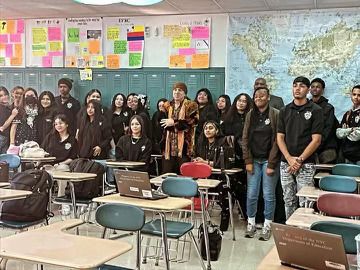These days, Stevie Van Zandt is moving to the beat of his own drum at the Brooklyn School for Social Justice. He meets with teachers and students as part of “Teach Rock,” a program he launched in 2006 to incorporate what he calls the science of music.
The program’s goal is to help cultivate an environment where students know that they’re loved and that they matter.
What You Need To Know
- Stevie Van Zandt launched "Teach Rock" in 2006 to incorporate what he calls the science of music and help cultivate an environment where students know they're loved and that they matter
- Van Zandt's "Rock and Roll Forever Foundation" offers the free program to educators
- TeachRock is geared toward middle and high school students but includes resources for learning at all levels
“We’re dealing with a different world now, you know, with a younger generation that’s smarter than us and faster than us, we had to come up with something that holds their attention,” Van Zandt said.
Educators at the Brooklyn School for Social Justice in Bushwick said “Teach Rock” accomplishes that mission.
“I actually use the ‘Teach Rock’ curriculum as literally the curriculum for my class. So adopting this curriculum and getting to the point where we are right now has just been organic," said teacher Liam Popper.

“Music has had an influence, especially American Music has had an influence, from all over the world. It’s good for them to see that there’s not as many things that keep us apart as they think — we are all similar in some way, shape or form,” said Brooklyn School principal Patrick Cooper.
Stevie Van Zandt’s “Rock and Roll Forever Foundation” offers the free program to educators. The 72-year-old “Rock & Roll Hall of Famer” has been in the entertainment business since 1969 and said he gets a real kick out of meeting the next generation. Zandt said he hopes to keep music and arts in the DNA of schools.
”There’s no wrong answers in art and we feel once kids are comfortable and we go to them — instead of dragging them to our old methodology, they tend to be more receptive,” Van Zandt said.



